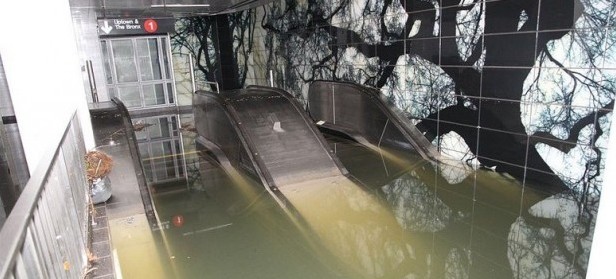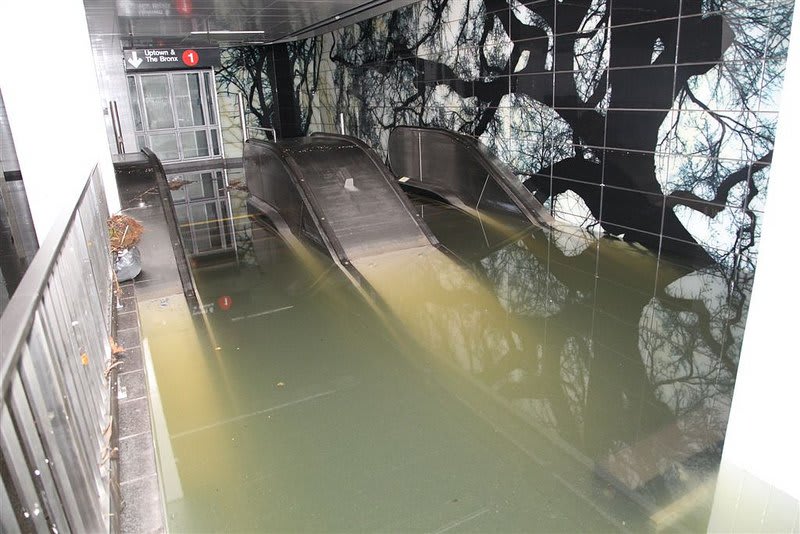If you’re reading this, you probably have power back by now. Or maybe you’re reading this at work. Or maybe you’re one of the lucky ones who never lost power in the superstorm-formerly-known-as-hurricane Sandy.
And if you’re reading this, you have probably also seen the never-thought-I’d-see-THAT-outside-of-a-Hollywood-blockbuster images that have been flooding the Internet: parts of New York City neck-deep in water; subway tunnels turned into log-flume tracks; 12-foot walls of water smashing into urban hubs. And how about the financial nexus of the world shut down for two straight days (which they tell us hasn’t happened since the ol’ blizzard of 1888)? The presidential campaign derailed days before the election? Pretty incredible.

If you have not been scrambling for hot water and a place to charge your iPhone, you may have had time to reflect on all of this.
To me, it is not just a reminder of how big G-d is, but of how small man is as well. Even the most powerful among us was not able to save NYC from shutdown. No amount of money was able to bring water to the burning houses in Queens. No amount of preparation could keep the airports open. Even folks who are not religious would have to look into the face of nature and admit powerlessness, if only for a time.
We go about our business every day, hardly realizing how much we depend on matters completely outside our control. When the power went out, most people just had to deal. Here in Passaic, Main Street has been completely disabled, including the kosher grocery store; many ran low on basic food supplies, until other supermarkets nearby opened up and got running again. What if they hadn’t? What if this had been an actual hurricane, a category 2 or 3 or 4? We could actually be without food.
For people who are well-off, the thought is hard to imagine. A personal famine in the age of plenty? But if the roads are blocked, if gasoline is inaccessible, if the power in the stores is out – it is a real possibility.
It wouldn’t take much to make such a scenario a reality: a drought; a serious oil embargo; a contagious epidemic – any of these could cripple a city, state, or nation far worse than what has already happened to us this week. We tend to forget nowadays that we still live in a world that runs on environmental processes. We are so detached from the natural world these days that we hardly realize that we still need rain to grow our food! There isn’t yet a laboratory on the planet that can synthesize wheat, or soybeans, or water (and odds are you wouldn’t survive for long on jellybeans and Laffy Taffy).
Our human frailty is brought to the fore in a disaster like this. Which is why it’s also such a great time for community building. We really need each other as people. We forget this too nowadays. We forget that in the long history of mankind, almost no society expected parents to raise children without an entire network of help. We forget that carving out time for friends and neighbors is not a luxury but a necessity to make it through life’s challenges (and that our ancestors, from the Biblical through the rabbinic times, all knew this well).
On the Day After Sandy I watched my neighbors across the street take turns sawing at branches and working on contriving a way to get an extension cord safely from one powerless house across the street to a powered one. We all appreciate the togetherness that comes out of these times; do we remember how much we need it?
The human condition is fragile and uncertain. It seems unlikely that we will ever be able to beat nature – to control the weather, to produce nourishment from inorganic materials, to create life from scratch in the lab. We will just have to live with the constant possibility of powerlessness.
But to recognize that and to cast our lots in with those around us – to recall even in times of prosperity and apparent control that we can’t go it alone – that is a message which ennobles us above all the creatures and forces of which nature is made. For nature is blind, and one beast cannot help another unless it is so commanded by its genetic makeup; but we can offer each other a cup of hot coffee when the power is out, a shelter from the storm, or simply a hug in a time of tragedy. And that is what makes us truly human in the face of a hurricane.
Rabbi Raffi Bilek, LCSW-C, is a counselor and speaker in Baltimore, Maryland serving clients all over the globe. Find him online at www.frumcounselor.com or www.BaltimoreTherapyCenter.com.
The words of this author reflect his/her own opinions and do not necessarily represent the official position of the Orthodox Union.
